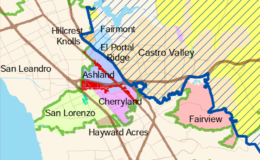Reform Castro Valley’s MAC
- By : Castro Valley Matters
- Category : Governance, Local Control, MAC
- Tags: #ElectTheCVMAC, #ReformTheCVMAC, castro valley, Castro Valley MAC, Elected MAC, Unincorporated Governance


Bring accountability to the people
The leadership of any community is central to the health and vibrancy of that community. This is why Castro Valley Matters (CVM) continues to advocate for an elected Municipal Advisory Council (MAC).
As we have worked in Castro Valley and engaged with various stakeholders within our community and across California, it has become clear that an elected MAC is at the heart of a broader call for reformed governance for unincorporated communities.
Some basic accountability measures could go a long way to ensure that our Castro Valley MAC better represents the community. And it is an opportunity for Alameda County to demonstrate that it takes seriously its role as our municipal government.
This is why we are asking that the following five steps be taken to reform Castro Valley’s MAC:
- Elect the MAC members from candidates drawn from our changing community;
- Develop and institute clear policies for filling MAC vacancies. Provide clear criteria about what is required to be a member and clarity about when service on the council begins and ends.
- Institute new MAC rules and procedure that clearly define and enforce term limits for the MAC officers so that all members are encouraged to step into a leadership role;
- Adopt a clear code of conduct for MAC members, including rules on disclosing and managing potential conflicts of interests, disclosure of contributions made to elected Alameda County officials, and appropriate engagement and behavior with members of the community.
- Require the MAC to seek input from the community at large through public forums, with reporting our community’s concerns back to the Board of Supervisors.
An Elected MAC for a changing Castro Valley
In order for the MAC to serve our community effectively, we must take action to make it a more representative body. Castro Valley is a rapidly changing community. It is more diverse than it has ever been, yet the MAC doesn’t reflect that diversity. An elected MAC will bring new voices to the Council and will better reflect our community. Electing our MAC, which is permitted under State of California law, would also compel members to develop a vision for their service based on the feedback and support of community members.
Elections are at the heart of representative governance. Yes, there are costs to elections. These costs, however, are minimal amid a county budget of $3.17 billion. And these costs are a marginal cost when they are included on a general election ballot compared to a stand-alone election.
And while some would argue that the MAC is “just advisory,” it is clear that Alameda County sees the decision-making of this council as important. We saw this explicitly when the Council supported a new path for the redevelopment of the Daughtrey’s building project after the initial developer failed to deliver the transformative project that many on the MAC and the community wanted. Decision-making backed up by Castro Valley voters would empower the MAC to be a more authoritative voice for Castro Valley and allow it to rightfully be an advocate for community interests.
Clear policies for service on the MAC
Until our MAC is elected, the appointment process needs to be transparent. Currently, transparency is lacking throughout the selection and appointment process. The community has not been regularly notified of openings on the body. And when a member’s term has expired, Alameda County allows a member to continue serving, even if Supervisor Miley has not sought to reappoint a member.
There is currently one vacancy on the MAC with the expiration of Linda Tangren’s term and her decision to leave the Council. Marc Crawford, whose term expired in May, continues to serve on the Council and was even re-elected as the MAC Chair without having been reappointed to the MAC.
In the past, several months have gone by with openings not being filled. Supervisor Miley and his staff must make filling vacancies a priority, and the selection process must be transparent through prompt publication of openings and encouraging emerging leaders to serve. In the future, Supervisor Miley must publicize the qualifications he wants to see in members, and explain the application process. The timeline for applications must also be publicly disclosed.
New rules and procedures to ensure refreshed leadership
The MAC should adopt new rules that limit the time that one member may serve as the Chair and provide a way for members to rotate through leadership positions. The current chair has served in this role since 2012. This creates a culture in which community member fear they have no voice and disincentivizes members to step up and lead the MAC.
Without rotating leaders, the council suffers from a lack of different points of view in the leadership positions. All members should join the MAC with the understanding that they will be called to serve in some leadership capacity in the course of their term.
A code of conduct to foster trust with the public
Anyone who steps up to serve their community should be commended for their service. Public service is time consuming, it takes you away from other obligations, it requires a willingness to understand the technical issues you might not be familiar with, and it requires you to listen members of the community.
The MAC has considerable influence on things that happen in Castro Valley. As a result, the members should be held to a high standard of conduct. Currently there is no code of conduct for MAC members. When members conduct themselves in ways that overstep their authority, there are no clear consequences for that behavior.
A MAC code of conduct should cover:
- Disclosure and management of potential conflicts of interest, including clear rules when a member should be recused from a pending issue because of an actual conflict of interest.
- Disclosure of financial contributions made to elected Alameda County officials, both at time of appointment to the MAC and on an annual basis once on the council.
- Appropriate engagement and behavior with community members, both during meetings and other engagements related to service on the MAC.
A code of conduct would foster trust in the MAC by building a culture of transparency and accountability.
MAC members in the community, inspiring engagement
MAC members should be encouraged to work with community stakeholders and spend time in the community, learning about the issues facing Castro Valley. Clear and actionable guidelines should be instituted that require MAC members to hold regular community input sessions, outside of regular MAC meetings. This is a standard practice for civic leader engagement across the country, and is a foundational part of our democracy. MAC members are ultimately positioned as the primary conduit between the public and our Supervisors, and engagement and communication practices must be adopted.
Ultimately, it rests with the Alameda County Board of Supervisors – Supervisor Miley in particular – to help Castro Valley transform our MAC into a more democratic and accountable institution. There is no single way to get this right. In fact, in a state approaching 40 million Californians with about six million of us in unincorporated communities, there are a lot different examples of unincorporated residents asserting local control in their communities. Unincorporated communities, particularly those that are larger than many incorporated communities, have a right to accountable local governance, whether they get that governance from a county or as a municipality.
Sonoma County, for example, most recently adopted policies for its MACs that accomplishes much of what CVM is recommending for a reformed Castro Valley MAC. These recommended policies and procedures include provisions for managing potential conflict of interests and management of leadership roles. Bylaws recently adopted by the Sonoma County MACs includes a provision compelling community engagement by members of that MAC.
A reformed Castro Valley MAC should have these provisions too.


